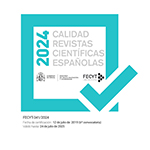La vita e le cose (Suicidio e identidad)
Resumen
La constatación del contenido analítico y reflexivo de una obra como Dialoghi con Leucò, con la que Cesare Pavese se aleja del entusiasmo dominante entre los intelectuales del panorama italiano posbélico, al poner en evidencia el inmovilismo del mundo y de la naturaleza humana, sirve como punto de partida para un interesante análisis sobre la relación del escritor piamontés consigo mismo y con el mundo que lo rodea. El motivo del suicidio tanto en sus novelas como en su obra diarística es aquí considerado como reflejo del constante proceso de autoanálisis que el escritor lleva a cabo a lo largo de toda su vida y como manifestación de una actitud concreta ante el mundo. Camino hacia la autodestrucción, por tanto, el de Pavese, donde se ven entrelazadas actividad literaria y reflexión identitaria.Descargas
Descarga artículo
Licencia
La revista Cuadernos de Filología Italiana, para fomentar el intercambio global del conocimiento, facilita el acceso sin restricciones a sus contenidos desde el momento de su publicación en la presente edición electrónica, y por eso es una revista de acceso abierto. Los originales publicados en esta revista son propiedad de la Universidad Complutense de Madrid y es obligatorio citar su procedencia en cualquier reproducción total o parcial. Todos los contenidos se distribuyen bajo una licencia de uso y distribución Creative Commons Reconocimiento 4.0 (CC BY 4.0). Esta circunstancia ha de hacerse constar expresamente de esta forma cuando sea necesario. Puede consultar la versión informativa y el texto legal de la licencia.










